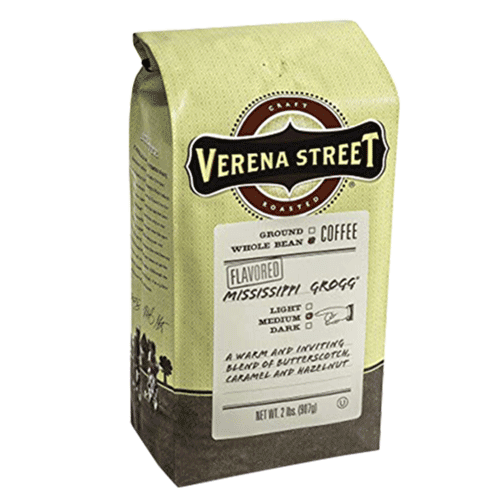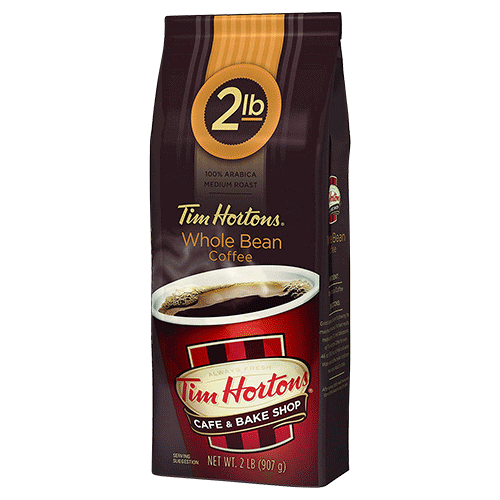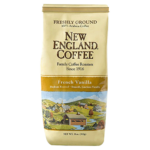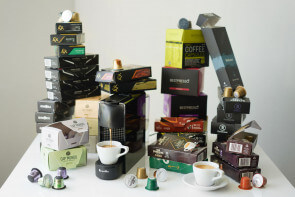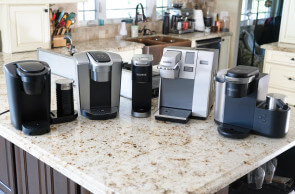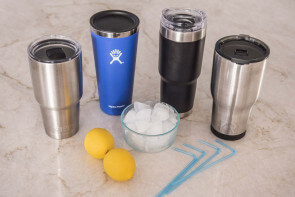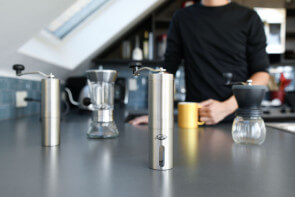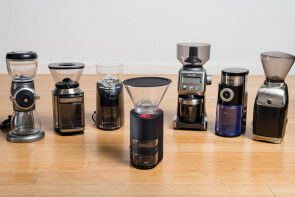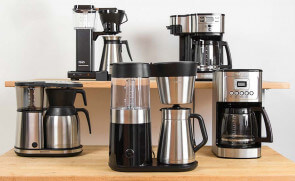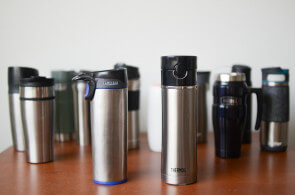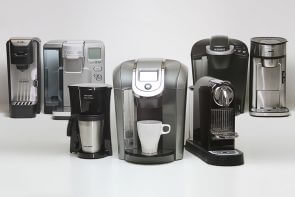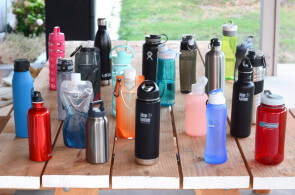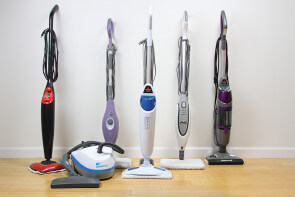
The Best Cheap Coffee Brands
We spent over four weeks commandeering the office coffee pot, brewing over 50 pots and consuming about 400 cups to find that Verena Street – Mississippi Grogg is the best cheap coffee brand. This light-roast, fair trade and kosher brand out-brewed the competition, pleasing even our pickiest taste tester and receiving complements such as “creamy” and “strong, but not overpowering.” For a bolder flavor profile, we recommend Marley Coffee medium roast or Koffee Kult dark roast.
We spent over four weeks commandeering the office coffee pot, brewing over 50 pots and consuming about 400 cups to find that Verena Street – Mississippi Grogg is the best cheap coffee brand. This light-roast, fair trade and kosher brand out-brewed the competition, pleasing even our pickiest taste tester and receiving complements such as “creamy” and “strong, but not overpowering.” For a bolder flavor profile, we recommend Marley Coffee medium roast or Koffee Kult dark roast.
Table of contents
- Compare the best cheap coffee brands
- 1. Best tasting: Verena Street
- 2. Best well-known brand: Tim Hortons
- Best coffee by roast
- How we selected products to test
- How we tested
- Important features to consider
- The bottom line
Compare the best cheap coffee brands
Well known coffee brands
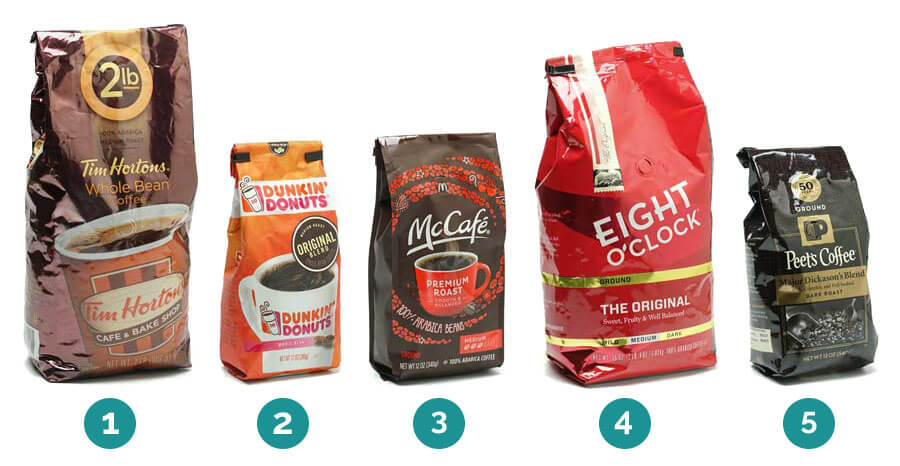
| Brand Ranking | Bean Type | Roast | Price per Ounce | Overall Rank |
|---|---|---|---|---|
| 1. Tim Hortons | Whole Bean | Medium | $0.69 | 4 |
| 2. Dunkin' Donuts | Whole Bean | Medium | $0.44 | 5 |
| 3. McCafe | Ground | Medium | $0.49 | 7 |
| 4. Eight O'Clock | Ground | Medium | $0.61 | 12 |
| 5. Peet's Coffee | Ground | Dark | $0.58 | 14 |
| 6. Folgers | Ground | Medium | $0.35 | 16 |
| 7. Caribou | Ground | Medium | $0.61 | 17 |
| 8. Seattle's Best | Ground | Medium | $0.50 | 18 |
| 9. Starbucks | Ground | Dark | $0.55 | 19 |
| 10. Maxwell House | Ground | Light | $0.23 | 20 |
Lesser known coffee brands
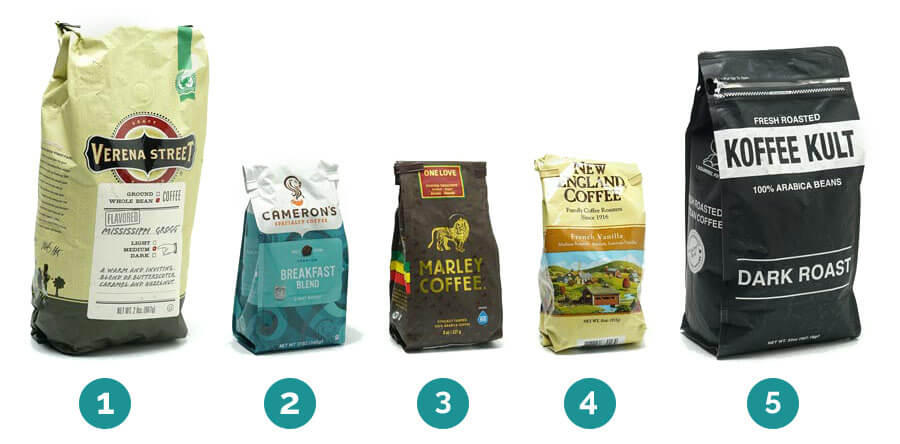
| Brand Ranking | Bean Type | Roast | Price Per Ounce | Overall Rank |
|---|---|---|---|---|
| 1. Verena Street | Whole Bean | Light | $0.62 | 1 |
| 2. Cameron's | Whole Bean | Light | $0.71 | 2 |
| 3. Marley Coffee | Whole Bean | Medium | $0.87 | 3 |
| 4. New England Coffee | Ground | Medium | $0.45 | 6 |
| 5. Koffee Kult | Whole Bean | Dark | $0.81 | 8 |
| 6. Subtle Earth | Whole Bean | Light | $0.53 | 9 |
| 7. Death Wish | Whole Bean | Dark | $1.25 | 10 |
| 8. San Fransisco Bay | Whole Bean | Medium | $0.62 | 11 |
| 9. Coffee Bean Direct | Whole Bean | Dark | $0.52 | 13 |
| 10. Kicking Horse | Whole Bean | Medium | $0.88 | 15 |
1. Best tasting: Verena Street
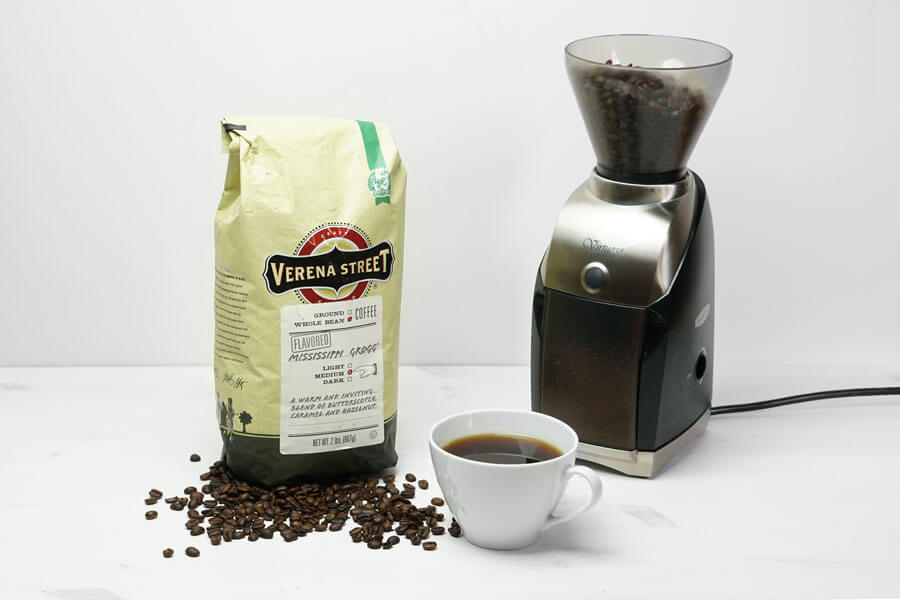
Freshly roasted and prepared in small batches, the Verena Street – Mississippi Grogg out-brewed all the other options with a warm and inviting taste our staff would love to wake up to. We found that this brew was rich and robust without being overpowering or tasting cheap.
Our trusty testers rated this coffee a 7.55 out of 10 on our overall testing scale. In the aroma category the coffee scored a 7.60 and received the most 10’s out of any coffee we tested. Those who like strong black coffee rated the aroma low with the thought it was going to be “fruity” or “weak,” but were pleasantly surprised with the taste. The coffee finish rated highly as well at 7.80 out of 10. Tasters specifically noted the caramel finish. Most guessed incorrectly that this was a Medium coffee roast.
The price is the exact average price of all the coffees we tested. The name Mississippi Grogg might throw you off, but this family owned and operated processing center is based in Iowa along the Mississippi river valley. Verena Street is 100% sustainably sourced from Rainforest Alliance certified coffee farms, is fairly traded and kosher. If you are a conscious consumer and look at where your money is being spent, we recommend checking out some other unknown brands we tested as well.
2. Best well-known brand: Tim Hortons
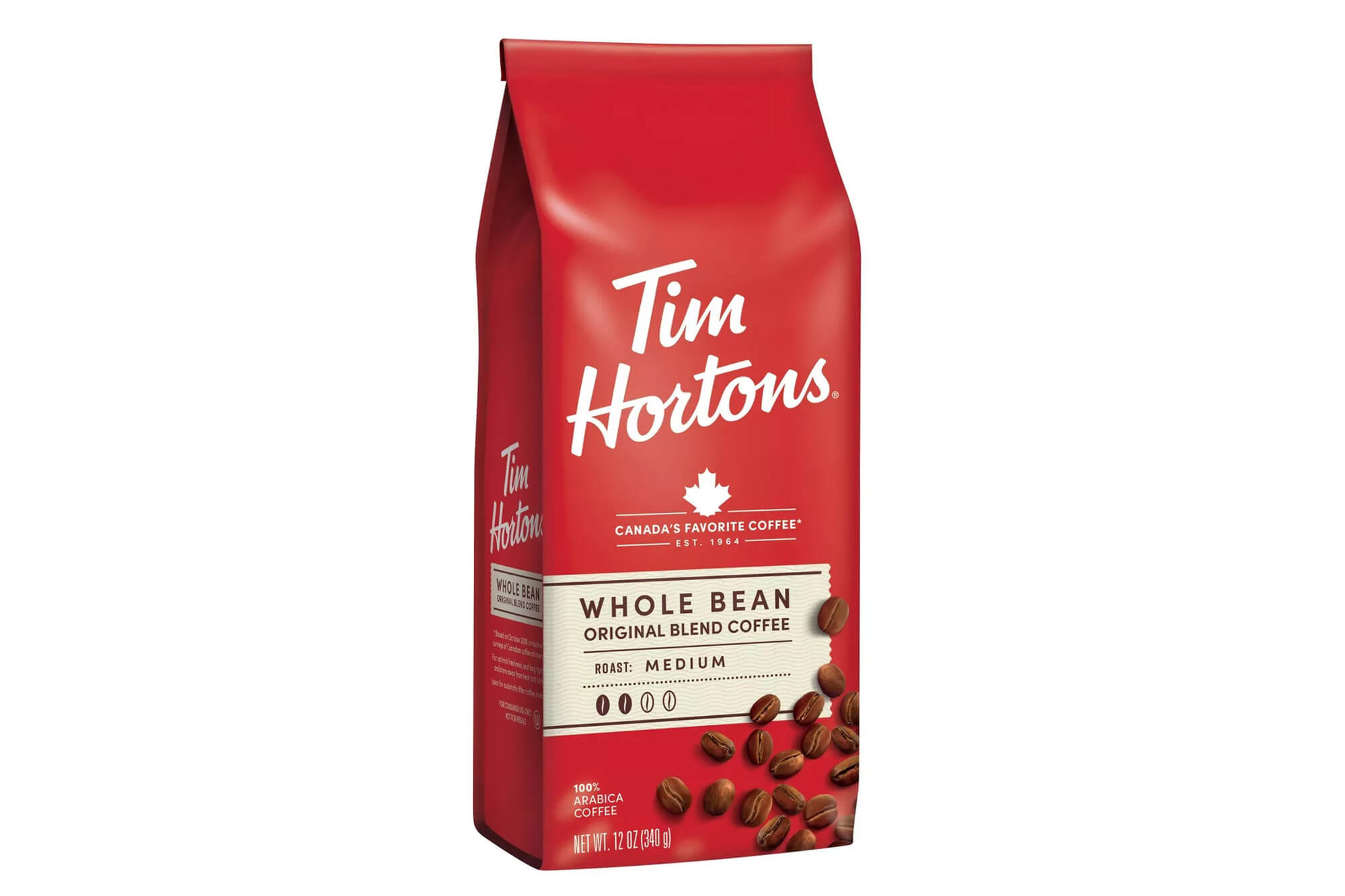
10/20/2020 update: Tim Hortons has updated their packaging for this medium roast coffee, but it’s still the same coffee! Amazon seems to stock much less of the whole bean variety (which we like better than ground), but we’ve linked to the available whole bean option without having to buy a 6-pack of these, which is their Canadian version.
Canadian favorite Tim Hortons whole-bean light roast has taken the top honors for coffee brands we know and love. Our testers knew right away that this was something they “grew up with” and left additional comments including “traditional,” “classic” and “homey.” In addition, testers guessed accurately that this was a medium brew.
Predating the conscious-consumer movement, Tim Hortons hosted its own Coffee Partnership to help the communities where they buy their beans in Brazil, Colombia, Guatemala and Honduras. A pillar of their community outreach program is the Junior Achievement program, aimed at helping middle school kids with education.
Back to the coffee taste, Tim Hortons roasts their beans in small batches and claims that only three people know their secret recipe. Our testers rated the coffee finish highest in the taste test, noting that it was just a good cup of coffee. Even better, this fail-safe coffee will only put you back $.69 per ounce.
Best coffee by roast type
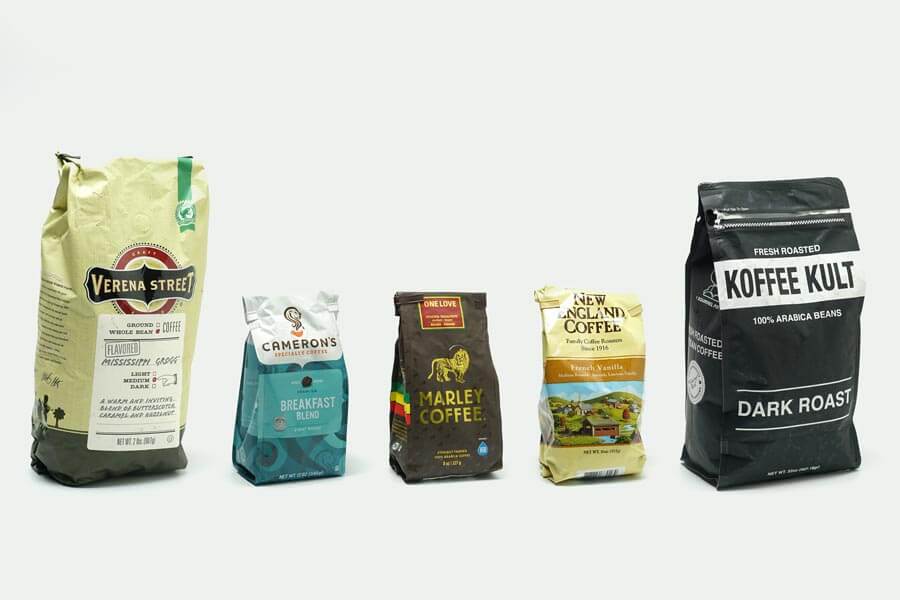
The best light roast and whole bean coffee was our top pick, Verena Street – Mississippi Grogg. The office chatter surrounding this taste test made it a staple on the office shopping list and is now in the rotation of coffee blends brewed. Receiving the most eight, nine and tens across the scoring board, people loved the natural hazelnut flavor found in the roast.
The best medium roast coffee we tested was Marley Coffee, which came in third overall in our test. Marley is an organic, ethically-farmed and 100% Ethiopian blend with herbal tastes including fruity wine undertones. Our testers loved the taste and finish of this coffee and guessed it was either a light or medium blend. One tester loved the “watermelon or green tea” undertones and most mentioned the unique taste that was a welcome change in the morning. Marley Coffee ranked as the most expensive coffee we tested at $.87 per ounce. Money well spent according to our testers.
The best dark roast was Koffee Kult dark roast. This 100% arabica coffee blend, sourced from Colombia, Guatemala and Sumatra offers a full body and rich option for your coffee palate. Our testers knew that this was a dark coffee roast by its strong aroma, but were pleasantly surprised by the wood-fired taste. Most testers did call out the bitterness of this coffee, but pointed out that it didn’t linger and the acidity was enjoyable. Again, this winner is one of the most expensive coffees we tested at $.88 per ounce, but if you love the bold coffee taste, this is for you.
The best ground coffee was New England medium roast. This coffee tricked our bold coffee lovers into thinking it would be a weaker or lighter coffee, but it won everyone over with the taste and overall quality. Our tasters noted the sweet smell and smooth taste of the New England Coffee’s medium roast. An added benefit of New England’s medium roast is the price, costing a very cool $.45 per ounce, this will please both your taste buds, and your wallet.
Notable brands you know
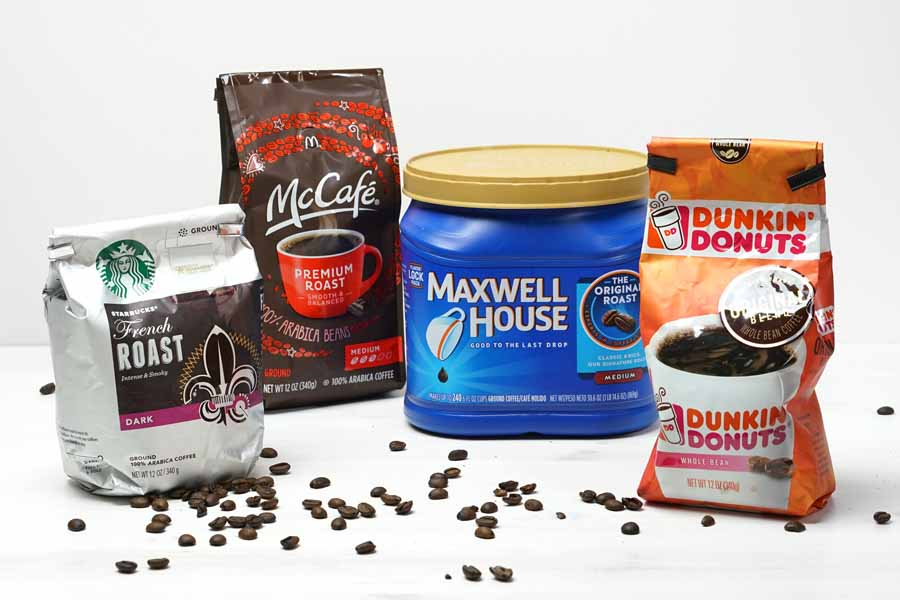
Coming in 5th on the list overall and 2nd on the known brands list, Dunkin’ Donuts medium roast scored major points as a great coffee choice. Testers were all over the place wondering what kind of roast this was due to its strong aroma and bold taste. Our office testers who enjoy a bold cup of coffee ranked this very highly in taste and finish, but others listed it as harsh and acidic. One tester noted that they enjoyed the coffee more when they let it cool down and added ice to it. We loved that idea! Another wallet friendly choice, Dunkin’ Donuts coffee will only cost you $.44 per ounce.
We couldn’t have a cheap coffee article without mentioning McCafe coffee! Rounding the top three, McCafe medium roast scored well among known coffee brands, but ranked seventh in our overall tasting list. Home-brewing this cup of coffee will only set you back $.50 per ounce, very reasonable and below average in cost. Our testers were split if this was either a medium or dark coffee, but either way it ranked well on quality. Our tasters also liked the balanced nature of this brew and included comments such as “bitter, but smooth” and “acidic, but fruity.”
There were two surprises at the bottom of our list, Starbucks and Maxwell, which ranked lowest for brands you know, as well as our overall list. These two coffee giants both received bad scores in taste and finish categories. Comments included “overly acidic,” “slightly burnt” and “basic.” Both costs were below average per ounce. Maxwell was the least expensive coffee that we tested at $.23 and Starbucks ranked in the middle at $.55.
When looking at the list as a top 20 choice we noticed that the popular brands ranked surprisingly low overall. Only three in the top 10 were brands that most people have heard of. Perhaps online shopping is providing availability to more brands that can be tailored to your taste buds.
Notable brands to discover
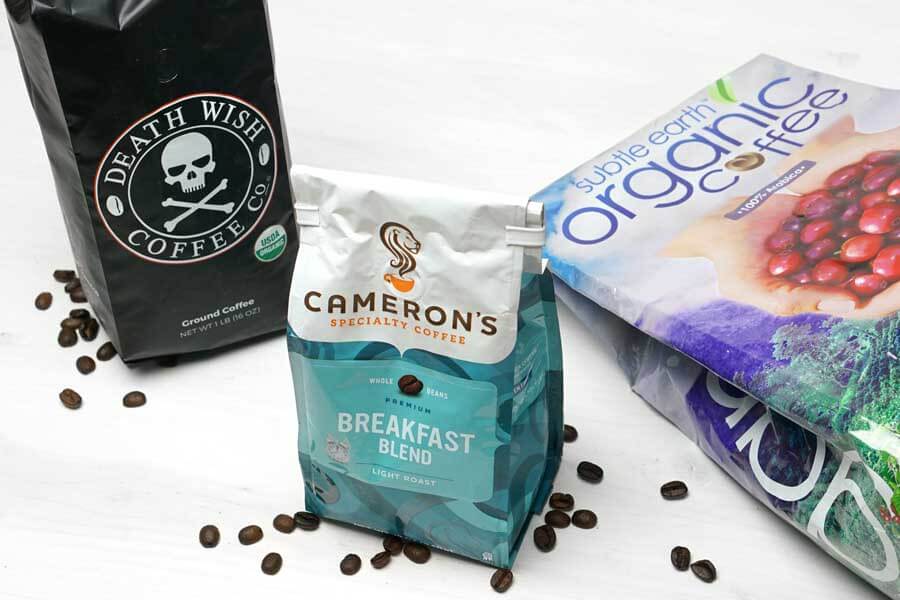
Our unknown brands overwhelmingly ranked high in all of the categories we tested. Our runner up for best overall coffee and unknown brands was Cameron’s whole bean light roast. Cameron’s offers drinkers another option in the sustainable and small batch category, but comes in as one of the most expensive options at $.71 per ounce. Tasters commented over and over that this was a smooth coffee and that taste wasn’t overpowering. The finish of the coffee ranked higher than any other we tested.
Rounding out the top ten on our overall list, and the top five in our unknown brands list, both Subtle Earth whole bean light roast and Death Wish whole bean dark roast have notable features to be considered for your new coffee of choice.
Subtle Earth whole bean light roast is one of the only coffees that made our list, boasting both certified organic and GMO free ingredients. You can tell the care that is taken from farming to finish when looking at the story of Don Pablo’s Subtle Earth coffee. Our tasters picked out a number of fruity and herbal flavors, but what won everyone over was the sweet finish with no added flavor in the beans. Costing you only $.53 per ounce, this flavorful cup provides more than just a boost of caffeine, it can also boost your savings.
Being advertised as the “world’s strongest coffee,” Death Wish whole-bean dark roast coffee is not for the faint of heart. We should mention here that this might not be considered a “cheap coffee” as it costs a very bold $1.25 per ounce, but we chose to test it as has a very large online presence and thousands of five-star reviews.
Our coffee testers do love a strong and bold cup of coffee, so though we expected it to rank highly, Death Wish sat in the middle of the pack due to its low marks in aroma and taste. It did gain major points for its finish though, where tasters noted that it was smooth, but had some overpowering bitterness to it. If you need a large jolt of energy with intense flavor, look no further than Death Wish coffee.
Overwhelmingly, the lesser known brands ranked higher and received more detailed tasting notes. When searching the description of these brands, you will find more information on specific origin, details in roasting and care in the small batches. The attention to detail made from the farming to the roasting will set you back a few more dollars, but know that along with a more satisfying cup of coffee you are also doing your part to better the world.
How we selected products to test
Our search began at the local grocery stores to see what was widely available to shoppers. We noted the ubiquitous blends and recorded their price per ounce. We then went to the reviewers on Amazon.com where coffee was available in all varieties. We considered options on Amazon, Prime Pantry and Amazon Fresh to find the best-rated cheap coffee options.
We narrowed our list to 20 brands total: 10 brands you know and 10 brands you want to know. Through our research we found that people are branching out to try more coffee flavors, sources and strengths.
Our research was then directed towards the price point and determining what classifies as a “cheap” cup of coffee. If you are heading to Starbucks to grab a grande cup of regular coffee, it will put you back $2.10. McDonald’s premium roast coffee will cost $1.29. Dunkin’ Donuts medium coffee is $1.89. Frappuccinos, lattes and mochas will double your coffee cost.
Our research has shown that the average ounce of coffee beans costs $0.51. Given a typical water to bean ratio, the average home-brewed mug costs $0.33 per cup. On the inexpensive side you can brew a cup for $0.15, or with pricey beans you will still only pay $0.57 per cup.
We found that there are a few major differences between coffee brands you know, and ones you don’t. The first being price. Coffee brands you know had an average per-cost-ounce of $0.51, twenty cents cheaper than unknown brands of $0.73. We first thought this might have been due to production costs from big farms and large processing facilities.
However, we quickly learned about two other factors that affected price: the source and batch size. Most brands you know are Arabica coffee sourced from Ethiopia. Unknown brands had more diverse sources and were a combination of small batch, organic, sustainable, fair trade and/or ethically sourced blends.
Something that kept coming up in our research was “conscious consumerism,” or awareness of the impact your coffee makes on the community, environment and overall quality of life of those who harvest and grow it. Campaigns for products free from animal testing, bee friendly pesticides, compostable packaging and sustainable farming are all part of conscious consumerism.
Sustainable farming is the production of food using techniques that protect the environment, public health, human communities and animal welfare. Seven out of ten of the unknown brands we chose listed organic, fair trade and sustainable farming methods, which is a major reason for the 20-cent increase in average price.
To further our research, we asked all of our coffee testers if they would spend an extra $1.00 on a product if it was proven that the company directly benefited the community or environment. Each tester said yes. In addition, when looking at overall ratings online, organically and sustainably-sourced coffee rated higher overall compared to your typical Arabica coffee.
As a result, the biggest factor affecting your coffee price is not the big brand name but the batch size, sourcing and farming techniques used to obtain it. When choosing a sustainable brand, you can rest assured knowing that while you will be spending a small amount more, you are also doing a small part to help the world.
How we tested
The coffee maker
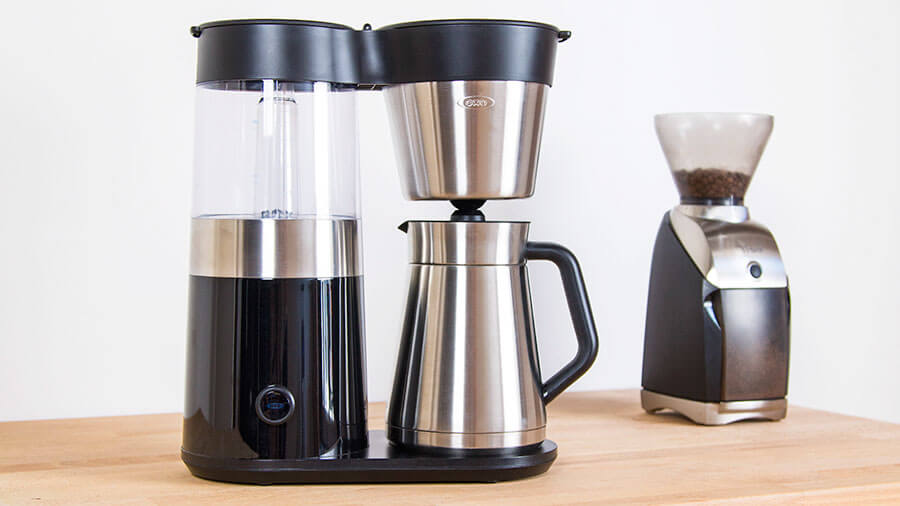
Now that we have a better understanding of how complex coffee is, we had to find the best coffee maker to ensure quality control for each brew. We chose the award winning and Speciality Coffee Association of America’s Certified (SCAA) Home Brewer: the OXO – On Barista Brain nine-cup coffee maker. This was also the winning machine in our review of the best drip coffee makers.
Taste testing
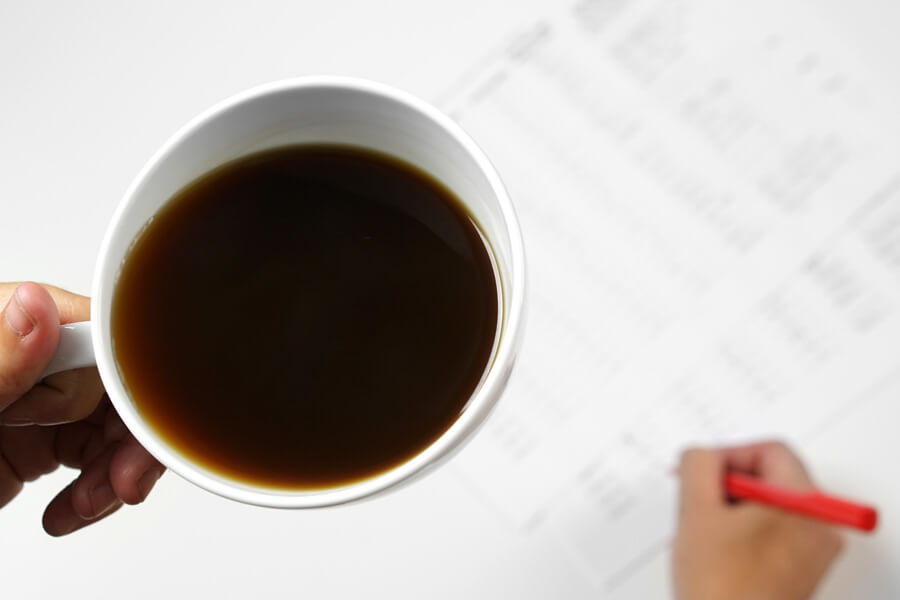
In search of the best beans overall, which can take into account many factors, we also wanted to see which were the best tasting coffee beans as well.
To ensure that no tester had a biased view of any cup they drank, for each test we opened a fresh bag of coffee and prepared in a separate room. Each pot of coffee was prepared based on the coffee instructions and brewed a full pot before anyone was able to have a taste. Each drinker was asked to rate the following categories on a scale of 1-10:
- Coffee aroma
- Coffee taste (Drinkers were asked to taste it black before adding any cream and sugar to their cup. We asked those who mixed the coffee for further feedback on how the coffee tasted with the mix-ins.)
- Coffee finish or aftertaste
- Overall quality
We also asked tasters to guess the brew type (light, medium or dark) and include any flavor notes before anonymously leaving their feedback to later analyze. We have a very diverse group of coffee drinkers, but most tend to drink stronger and bolder coffee. When analyzing the results, we found that the taste testers overwhelmingly liked the stronger tasting light and medium roasts, which matched their pre-testing preferences.
Important features to consider
Coffee source

Your favorite coffee connoisseur might have an argument for single origin vs blended origin beans, but the average coffee drinker will not taste the difference. Each origin has a unique attribute that is added to the bean, but the taste is not the main reason to look into blended or single origin. There are very few regulations that mandate disclosure of type, or percentages, of the blends in your bag of coffee. As a result some expensive blends may be a low percentage of a desirable origin and the majority could be from a less desirable origin.
The important factor to consider with your coffee source is the processing procedure in the location from which it came. For example, coffee beans that are sourced from Ethiopia or Brazil are processed naturally and result in bold and fruity flavors. Africa processes their beans in a washed process that produces more well-balanced and complex flavors with noticeable acidity when roasted. On the other hand, coffee that is sourced from Central and South America tends to be more expensive due to the processing method that reduces mold on the beans.
Arabica vs. robusta beans
Coffee can be compared to wine in terms of flavor because it is also affected by soil, altitude and the region in which it’s grown. The two types of coffee bean options are Arabica and Robusta: But what does this mean? The easiest way to categorize the two is by the altitude in which they grew. Arabica beans are grown in the mountains at an altitude above 2000 feet, while Robusta coffee is found below that, typically on flat plantations.
Arabica is the more desirable bean, and you will find it in nearly all your daily coffee blends. Arabica beans are more popular because they are grown in richer soil that allows the bean to become naturally mild and aromatic. Arabica is a fragile, oval-shaped bean that needs to be grown in cool and subtropical climates. Arabica beans contain about 60% more sugar content than Robusta, adding to their delicious taste.
Robusta plants can carry as much as three times the caffeine of Arabica, and they are known to have a stronger and harsher taste when roasted. You won’t find Robusta coffee in many blends today as it only comprises 25% of the market, which is mainly restricted to instant black coffees and Italian espresso blends.
Both beans have a range of grades suitable for coffee drinking, but there is a substantial price difference with Arabica beans; they cost nearly double Robusta. This is partly due to the less labor intensive and higher yield harvest. If given a choice, nearly all experts agree that Arabica coffee is the way to go.
All beans we tested were Arabica beans and still fell under the “cheap” category.
Roast type
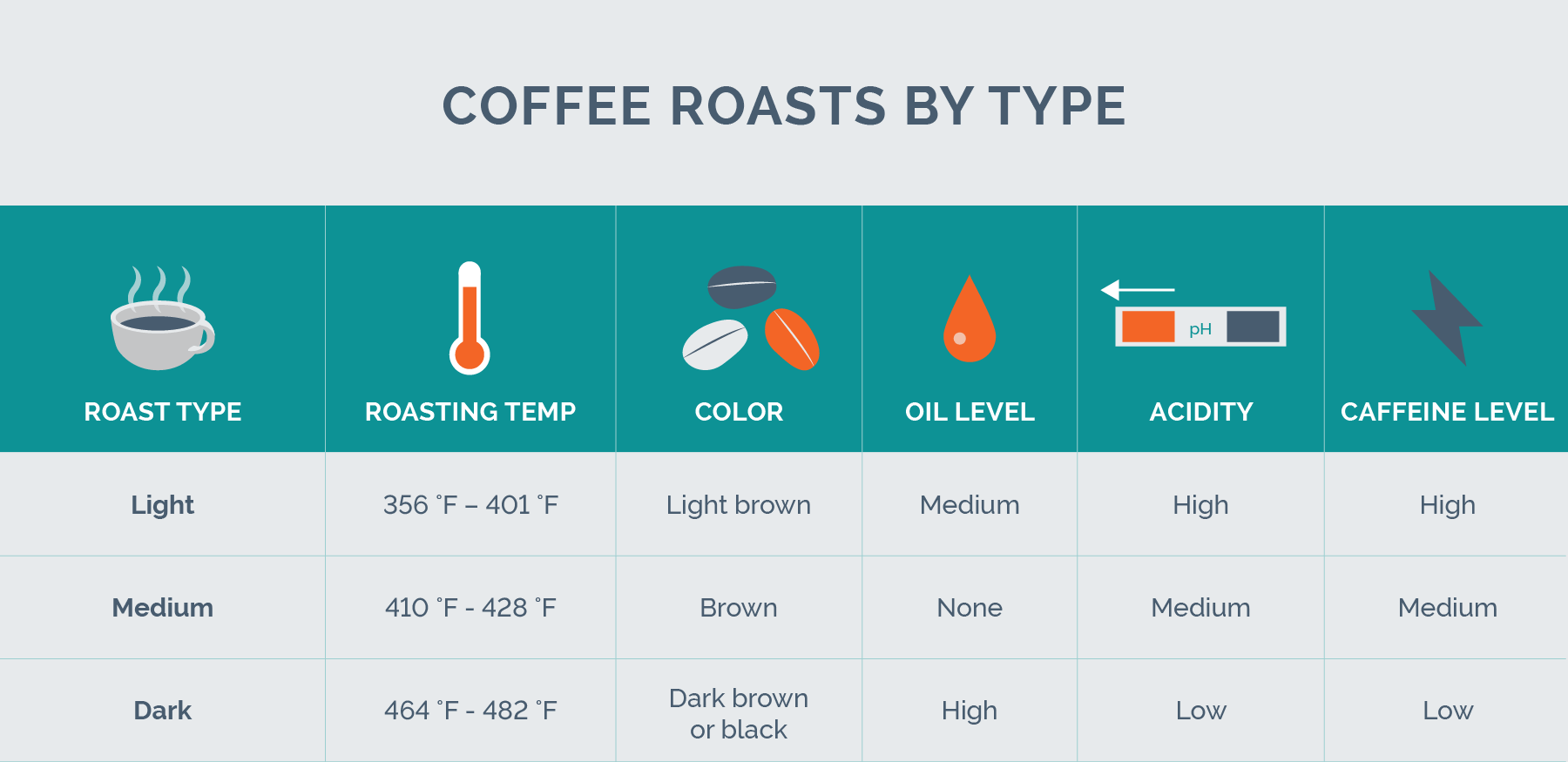
Did you know that lighter roasted coffee actually has more caffeine than darker roasts? The purpose of the coffee-roasting process surprised us. Before roasting, coffee beans are soft with little taste. The roast starts the process of adding flavor. Age, processing method, grind and brew type will also play a role.
Light roast beans and grounds are light brown in color with minimal oil on the surface of the beans. This retains most of the caffeine and tends to be more acidic. Lightly roasted beans reach an internal temperature of 356°F – 401°F, where they crack just a little and expand in size.
Medium-roasted coffees will show no oil on the surface and have a balanced flavor, aroma and acidity, again with more caffeine than dark roasts. They are roasted to an internal temperature of 410°F – 428°F, allowing the beans to expand but not past a second crack.
Dark roasts are easily identified with their rich dark brown or black color. Dark-roast beans will have noticeable oil on the surface and taste more bitter, smoky or even burnt. As a coffee roast gets darker, it loses the origin flavors and takes on the flavor mainly from the roasting process. These beans are largest of the three, reaching an internal temperature of 464°F – 482°F, just past the 2nd crack.

Ground vs. whole beans and freshness
Once purchased, the most important factor for brewing your own coffee is the freshness. It’s not a question of whether your coffee will go bad, but when. When making your first cup of coffee in the morning most people would agree that making it quickly and easily is the key, which is the biggest benefit for ground coffee, but you may be sacrificing freshness and taste for convenience.
We love opening up a bag of ground coffee, enjoying the aroma, then easily scooping it into the coffee maker to brew. But, if you have a little bit more time in the morning and a coffee grinder, you will benefit from a bolder-flavored coffee by grinding your own coffee beans.
Coffee beans hold their taste in the bean oils, and once beans are ground, the oils will evaporate and the taste can go flat. The vacuum seal on ground coffee only holds the oil until opened. So as the grounds of coffee go down in the bag, so will the taste. Be sure to reseal the bag after each use.
The question remains, once a bag is open, how long does it last? There are a few factors to consider. The first usually depends on the roast date, the closer to the roast date the fresher your coffee is going to to taste. Next is the coffee bean type, ground coffee doesn’t maintain its fresh taste very long. Seattle Coffee Gear says that ground coffee sealed in a cool, dark place will stay fresh for about two weeks, while properly stored whole coffee beans will stay at best quality for about four weeks after opening at room temperature. Oxygen is your biggest enemy here.
All experts agree that no matter the bean type, ground or whole, they recommend storing your coffee in an airtight container in a cool and dark place. If storing unopened coffee in the pantry, you can expect ground coffee to last up to five months and whole bean coffee to last for up to six months.
The bottom line – Verena Light Roast

Making a change from your beloved coffee brand might seem like a daunting task, but considering the vast amounts of tasty, wallet-friendly and environmentally savvy options, we recommend you add the Verena Street – Mississippi Grogg to your morning routine.
Verena Street sells both whole-bean and ground coffee, decaf, espresso and three other roasting options that can please even the pickiest coffee drinker. We found this brand had a cost point that was right in the middle of all the brands we tested, making it a smart budgeting choice. Testers loved the sweet hazelnut aroma, the surprisingly bold flavor and the caramel finish that shot this coffee to first place in whole bean coffee, light roasted coffee and best overall taste.
More Reviews
Keurig - K-Elite
RTIC - 30-Ounce Tumbler
The Best Manual Coffee Grinders
JavaPresse
Bodum - Bistro
OXO - Barista Brain
Thermos - Sipp
The Best Single-Cup Coffee Makers
Keurig - K-Elite
Klean Kanteen - 20-Ounce Insulated
Instant Pot - DUO60
Shark Genius - S5003D
Anolon - Advanced


